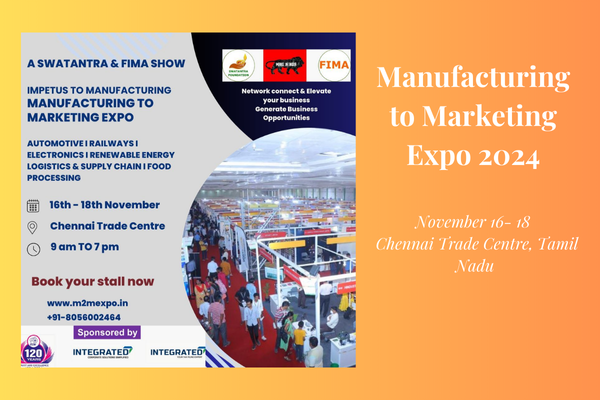MSME Perspective: Rising Cost, Access to Finance and Skilled Manpower are
major challenges, Reveals Borzo Report
● Financial Constraints: Access to finance, borrowing costs, and working capital remain
significant barriers.
● Logistics & Quick Commerce: High delivery costs and delays are critical challenges
impacting growth.
● Automation Dilemma: While 77.7% of MSMEs are open to automation, affordability and
training costs pose hurdles.
● Future Outlook: Over 53.5% of MSMEs anticipate market expansion in FY26 & FY27,
signaling optimism.
A recent survey conducted by Borzo across over 20 Indian cities, the study captures insights from MSME owners on rising costs, delivery challenges, and digital readiness.
The findings highlight sectoral resilience amid inflation, skill shortages, and evolving intra-city logistics in post-pandemic India.
As India’s Micro, Small and Medium Enterprises (MSMEs) navigate the post-pandemic economy, they face mounting pressure from rising operational costs, financial constraints, and a persistent shortage of skilled manpower. Yet, despite the headwinds, the sector displays remarkable resilience, with many enterprises adapting through technology, logistical innovation, and regional diversification.
Recent data gathered across more than 20 Indian cities—including major hubs like Mumbai, Bengaluru, and Delhi, as well as Tier-II locations such as Jaipur, Surat, and Guwahati—reveal a complex but evolving landscape. These insights, drawn from a cross-section of MSME owners in trading, manufacturing, and services, underscore both long-standing structural issues and emerging trends.
The Cost Conundrum
Cost escalation emerged as a central concern. Approximately 30% of MSMEs reported increased production expenses, while logistics accounted for a significant portion of operational overhead. Manpower costs and shrinking consumer demand also ranked high among the challenges, illustrating how inflation is constraining business margins.
Though nearly four in five enterprises claimed profitability, sustainability remains a concern amid shrinking margins and heightened competition from larger players with greater price flexibility and digital integration. The findings also highlight that most businesses operate with lean teams, with nearly 72% of respondents employing fewer than ten people, limiting their ability to absorb external shocks.
Financial Access and Automation Gaps
One of the most persistent constraints continues to be access to affordable credit. Entrepreneurs cited high interest rates, cash flow challenges, and lengthy application processes as deterrents to borrowing. These issues are particularly acute in Tier-II and Tier-III cities, where financial services penetration is uneven.
Interestingly, a growing number of MSMEs are open to automation, recognising its potential to streamline processes and reduce long-term costs. However, uptake is restrained by the initial cost of implementation and lack of integration support. Around half of the surveyed enterprises identified price barriers as the leading obstacle to digital transformation, followed by concerns related to training and compatibility with legacy systems.
Despite these limitations, over 77% of MSMEs expressed readiness to automate their operations in the coming years, particularly in functions related to supply chains, customer engagement, and finance.
Delivery and Distribution: A Shifting Terrain
The logistics ecosystem, essential for MSME scalability, is undergoing transformation. Many enterprises reported growing dependence on fast and reliable intra-city delivery to meet evolving customer expectations, particularly in urban and semi-urban markets. Delivery within 30 minutes to 2 hours is increasingly becoming the benchmark, especially for product segments linked to food, essentials, and consumer durables.
In response to these demands, MSMEs are actively diversifying their delivery models. A significant share now rely on next-day courier services or third-party aggregators, with a smaller segment managing in-house fleets. However, concerns remain: high logistics costs and unreliable schedules were commonly cited as barriers to efficiency, especially for smaller firms with limited bargaining power.
An important shift is the adoption of hyperlocal delivery frameworks, which allow for flexible, rapid fulfilment across multiple destinations. MSMEs employing such models reported higher customer retention and better last-mile efficiency, particularly when integrated with app-based tracking and smart routing technologies.
Gender and Youth Dynamics
Another notable trend is the increasing role of women-led and women-managed enterprises, comprising over 62% of respondents in certain sectors. These businesses are not only contributing to income generation but also shaping more inclusive business environments.
The sector also continues to skew youthful, with over 80% of founders or managers between the ages of 21 and 40. This demographic tilt bodes well for digital adoption and responsiveness to market shifts—factors that are likely to determine long-term viability.
Looking Ahead
Despite current obstacles, more than half of the MSMEs surveyed anticipate growth over the next two years. Their strategies centre around tech adoption, investment in logistics, and better integration into government support schemes. There is a clear appetite for innovation, provided the enabling ecosystem—finance, infrastructure, and skilling—keeps pace.
The findings offer a nuanced view of India’s enterprise backbone. While vulnerabilities remain, particularly in areas of cost management, access to finance, and delivery infrastructure, the capacity for adaptation is equally evident. The evolving landscape of intra-city logistics and smarter automation tools are proving to be key enablers—helping businesses respond to consumer expectations in real time.
As India celebrates World MSME Day, the sector’s trajectory will depend not only on macroeconomic policy, but also on practical innovations and service models that meet the evolving needs of this diverse and dynamic business constituency.
Author Profile
Latest entries
 Cyber Security1 December 2025LogRhythm | Exabeam Expands Saudi Presence with MIS Partnership and New Customer Innovation Center in Riyadh
Cyber Security1 December 2025LogRhythm | Exabeam Expands Saudi Presence with MIS Partnership and New Customer Innovation Center in RiyadhCircular Economy28 November 2025Bioeconomy, Circular Economy, and Post-Growth Paradigms: Rethinking Economic Expansion
 AI28 November 2025AI Unlocks Cancer’s Hidden Biology, Paving the Way for Truly Personalized Therapy
AI28 November 2025AI Unlocks Cancer’s Hidden Biology, Paving the Way for Truly Personalized Therapy FEATURED15 November 2025Amul and IFFCO Top Global Rankings: A New Benchmark for Inclusive Enterprise Models
FEATURED15 November 2025Amul and IFFCO Top Global Rankings: A New Benchmark for Inclusive Enterprise Models











